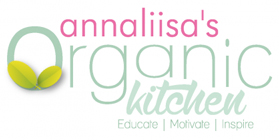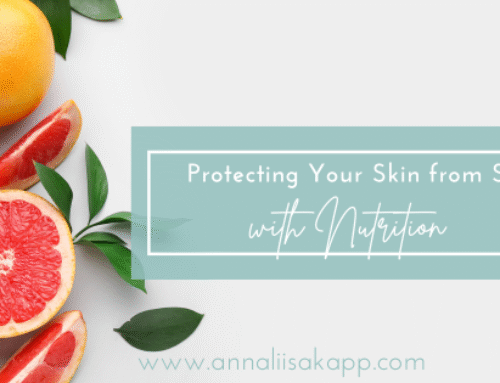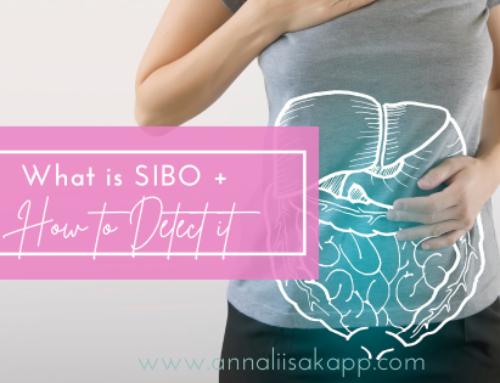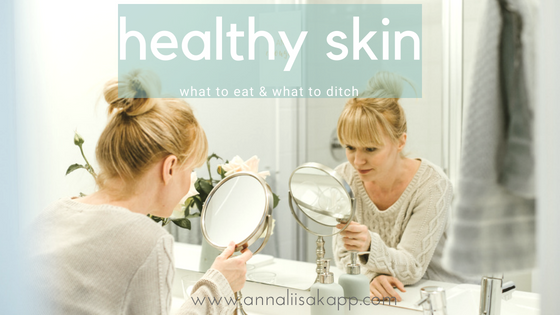
There are so many things that can go wrong with the skin: dryness, redness, blemishes, etc.
Healthy skin is a reflection of internal health. There are many creams and cosmetics to put on top of your skin. But, there are also lots of things you can do to nurture and nourish your skin to better health from the inside.
How better to do this than with food?
Your skin needs many nutrients: water, essential fats, vitamins, and amino acids. Here are seven foods (and drinks and lifestyle tips) I highly recommend if your goal is healthier-looking skin. As a bonus, I have included a short list of some key foods to consider avoiding.
Let’s dive in.
.
Skin Food #1 – Water
No doubt hydration is key for healthy-looking skin! Water and other hydrating fluids are great to help your skin stay moist and supple.
And for a bit of an extra anti-inflammatory hydrating boost, try boosting your water with anti-inflammatory green tea (sugar-free if possible).
If you have a hard time drinking water, try adding some fruit, herbs, or cucumber to your water to make it taste better and add a burst of antioxidants. (here are some recipes)
You can also increase your water intake through food, water rich fruits and veggies include: cucumber, celery, and watermelon!
.
Skin Food #2 – Fish
Fish contains many nutrients important for skin health – omega-3s, and vitamins A and D to name a few.
Omega-3s are anti-inflammatory to help cool the flames of inflammation. Vitamin A can help with blemishes and dryness, while vitamin D helps with skin tone. I recommend eating fish 3 times per week and choosing cold water fish like wild salmon, mackerel, and sardines. If you’re not eating fish for personal reasons, I would highly recommend a high quality fish oil taken daily. You want to look for a product that uses safe filtering processing methods that contain no ethyl esters (EPA and DHA bound to alcohol molecules) nor additional chemical processing. (I use this one with my client and myself)
.
Skin Food #3 – Bell peppers, citrus, and broccoli
Collagen is one of the most abundant proteins in our body. It’s also known to help our skin stay firm and supple.
Vitamin C is necessary for your body to make collagen. So foods rich in vitamin C are great for your skin. Cue: bell peppers, citrus, and broccoli.
FUN FACT: Overcooking vitamin C-rich foods can destroy some of the skin-supporting vitamins. So, try having these lightly steamed or raw for maximum vitamin C levels.
.
Skin Food #4 – Bone broth
Homemade bone broth contains a lot of the amino acid glycine. Glycine is another essential component of the skin protein collagen.
Glycine helps speed the healing of the skin and the gut. Win-win. You can try making your own bone broth, get the recipe here.
If you’re not into bone broth, taking a high quality grass-fed collagen powder is so helpful for healthy skin, hair, nails, and joints. Collagen also helps repair gut lining and increase nutrient absorption, and is great for cellulite and stretch marks.
.
Skin Food #5 – Pre and Probiotic rich foods
We really can’t talk about skin health without mentioning your gut health at least a few times. The state of your gut flora (your gut microbes or bacteria) is a direct reflection of what your skin health. If you have a lot of toxins in your digestive system, the skin, your largest detox organ, will get backed up and start to show signs of distress like acne.
If your gut is inflamed due to food sensitivities, toxins, and leaky gut, you will most likely show it in your skin as eczema.
When you provide your body with the right type of bacteria from fermented foods (like sauerkraut, kefir, yogurt, and miso – my favourite recipes are here), high quality probiotics, and prebiotics (fibre, veggies, some grains) your gut will start to flourish and heal. Only then can your skin truly heal as well!
Aim to include at least one serving of fermented foods into your diet daily, supplement with a great probiotic when needed, and feed the healthy gut bacteria with prebiotics!
.
.
Skin food #6 – dark chocolate ~ the antioxidant powerhouse
Free radicals from toxins and bodily processes can damage DNA, cell membranes, fats, & enzymes and oxidative stress affects all organs and is linked with all diseases & aging. Our ability to produce antioxidants in the body declines with age, so we need to get them from our diet. Lucky for us, cacao is one of the top antioxidant rich foods on the planet! The trick is to get the best quality cacao a with less sugar (as sugar damages our skin). Look for 70%+ dark chocolate sweetened with coconut palm sugar (I really like the Zimt brand available in health food stores). And why not make your own chocolate? Check out these recipes.
Other antioxidant rich foods include: wild blueberries, cranberries, pecans, elderberries, blackberries, red beans, and cilantro.
.
Skin “Food” #7 – Sleep more & stress less
I know these aren’t exactly foods, but they’re an important part of naturally great skin. When we don’t sleep enough, or stress too much our body flips on systems that affect our whole body… including our skin.
Stress hormones can increase inflammation and lead to not-so-healthy looking skin. Prioritize sleep and stress management, and you can see results in your life, and in your skin.
.
Watch out for these foods
Some foods are allergenic or inflammatory. These can cause all sorts of issues in your body, including affecting your skin.
It’s hard to come up with one list of inflammatory or allergenic foods for everyone. Each person is biochemically unique, so you may have to go through this and see what applies to you. There are a few common allergens that may be a good bet to eliminate from your diet.
The first is processed foods. These are pretty much not-so-good for everyone. And they can affect your health in so many ways, including how your skin looks & feels. This is because the processing of foods depletes many vitamins and minerals that are essential for healthy skin (like C and B vitamins), they are usually higher is sugar (hello inflammation and wrinkles), and use oxidized oils like soy or vegetable oils that cause free radical damage (even more wrinkles!!). Try ditching pre-packaged and fast foods in favour of whole foods as much as possible. Not just for your skin, for your whole body (and mind).
The second is gluten. While only a small number of people have serious reactions to gluten (i.e., celiac disease), many more people are intolerant to it. Gluten is a protein found in wheat, barley, rye and a few other grains. Many people have had several health concerns, including skin issues, clear up after eliminating gluten from their diets. As gluten contributes to leaky gut, and leaky gut is associated with eczema, I would highly recommend skipping gluten for 6 weeks to allow your gut to heal.
Third in line is dairy. It could be a hormonal response or even an insulin response. We don’t quite know why, but many people who cut out dairy report better skin and less acne. If you have digestive issues (like bloating, constipation, or loose bowels), then definitely look for dairy free alternatives that are made of whole foods. Examples would include coconut milk creamer for you coffee, cashew cheese instead of goat cheese on your salad, and ice cream made of bananas instead of cream.
Fourth is sugar. For some individuals, sugar can have a huge effect on skin health – especially acne. Acne is sometimes called ‘diabetes of the skin’ as it contributes to blood sugar imbalance, which messes with hormonal imbalance, which leads to acne.
Sugar – and all simple carbohydrates (glucose) in general, doesn’t matter if it’s from a potato chip or a cupcake – increase your insulin levels and they can increase inflammation in the body. It also impairs liver function as excess glucose is stored in the liver as fats and reduces the body’s ability to detoxify.
What’s more, sugar accelerates the breakdown of collagen in the skin, which can speed up the process of aging.
While the occasional sugar laden sweet is fine, I recommend switching to low glycemic sweeteners like monk fruit, stevia, yacon syrup, or coconut palm sugar in your day to day life.
.
Conclusion
Skin health is not just about what you put on your skin, but what your skin gets from the inside too. There are lots of important nutrients and foods to help support healthy skin. Which also means, that there are lots of foods that can affect your skin in negative ways as well.
Hydrating, eating nutrient dense whole foods, and avoiding common allergenic and inflammatory foods might make all the difference for you. And I would also recommend a bio-available and hypoallergenic multi vitamin (like this one) to fill in the gaps, help the body detoxify, and make sure you have all the nutrients necessary for healthy skin!
xx
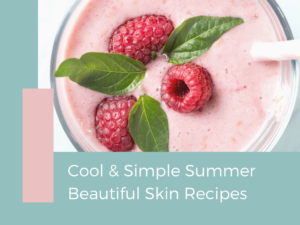 Beautiful skin starts with whole foods. Download your free mini booklet that
Beautiful skin starts with whole foods. Download your free mini booklet that
contains simple & delicious cooling summer recipes with nutrients that nourish the skin from within!

